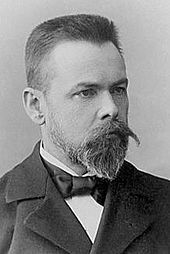Alexander Dmitrievich Kastalsky
Alexander Dmitrievich Kastalsky ( Russian Александр Дмитриевич Кастальский ; born November 16 . Jul / 28. November 1856 greg. In Moscow ; † 17th December 1926 ) was a Russian composer , choral conductor , folklorist and musicologist .
Life
Kastalsky, son of Archpriest Dmitri Ivanovich Kastalski (1820-1891), studied music theory and composition with Pyotr Ilyich Tchaikovsky and Sergei Ivanovich Taneyev at the Moscow Conservatory . In 1887 he joined the Moscow Synodal College for Church Hymn of the Holy Synod as a lecturer , headed the Synodal Choir from 1907–1910 and in 1910 became director of the college. In 1911 he went on a concert tour to Europe with Filipp Petrovich Stepanov .
Kastalski's main activity was sacred music . In particular, he opened the way for the music of the Russian Orthodox Church to develop further by renouncing the rules of profane music. To illustrate the thematic development, he used the old Russian musical notes . The synodal choir directors Wassili Sergejewitsch Orlow, Nikolai Michailowitsch Danilin and Nikolai Semjonowitsch Golowanow performed Kastalski's choir songs. Kastalski's followers included Pavel Grigorjewitsch Tschesnokow , Alexander Tichonowitsch Gretschaninow , Viktor Sergejewitsch Kalinnikow and Sergei Wassiljewitsch Rachmaninow .
After the October Revolution of 1917, Kastalski worked as a musicologist, devoting himself particularly to the harmonies of Russian folk songs , using Western European musical language with reference to tonality . Kastalski continued the closed Synodal College for Church Singing from 1918 to 1926 as the People's Choir Academy , which eventually became part of the Moscow Conservatory.
In 1922 Kastalsky became a professor at the Moscow Conservatory. He wrote music for the "heroic Soviet work", such as the hymn of the work in 1920, Lenin - on the coffin for speaker, choir and symphony orchestra in 1924 and Red Rus for choir and orchestra with folk musical instruments.
Kastalski's grave is in the Novodevichy Cemetery , where his wife Natalija Lavrentjewna Kastalskaja (1861–1941) rests.
literature
- SG Swerewa: Alexander Kastalski - essays, materials, memories, letters . Moscow 2006 (Russian).
- SG Swerewa: AD Kastalski . In: History of Russian Music. Musyka, Moscow 1997, Volume 10A, pp. 274-306, ISBN 5-7140-0646-1 (Russian, accessed January 3, 2016).
- Kastalsky, Alexander Dmitrievich. In: Soviet Encyclopedia , Moscow 1990, p. 240, ISBN 5-85270-033-9 (Russian, accessed January 3, 2016).
- K. Dmitrewskaja: Alexander Dmitrijewitsch Kastalsky . In: Russian Soviet Choral Music . Moscow 1974, pp. 5–42 (Russian, accessed January 3, 2016).
- Svetlana Zvereva: Alexander Kastalsky: His Life and Music. 2003 (translated by Stuart Campbell)
Web links
Individual evidence
- ↑ a b Musica Russica: Alexander Kastalsky (1856–1926) (accessed on January 4, 2016).
- ^ AD Kastalski: The peculiarities of the Russian folk music system. Moscow St. Petersburg 1923, Moscow 1961 (Russian).
| personal data | |
|---|---|
| SURNAME | Kastalsky, Alexander Dmitrievich |
| ALTERNATIVE NAMES | Кастальский, Александр Дмитриевич (Russian); Kastalsky, Alexander Dmitriyevich |
| BRIEF DESCRIPTION | Russian church musician, composer and choir director |
| DATE OF BIRTH | November 28, 1856 |
| PLACE OF BIRTH | Moscow |
| DATE OF DEATH | December 17, 1926 |
| Place of death | Moscow |
